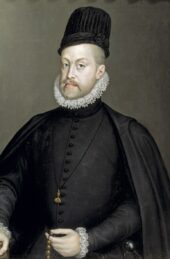It is estimated that one in six people in England have Huguenot ancestry. Yet the Huguenots (Protestants who were largely artisans and professionals) integrated so seamlessly into their adopted countries that, generations on, it is easy to forget the circumstances which forced them to flee their native France in the 17th century.
The wars of religion between Protestants and Catholics raged in France during the second half of the 16th century where hatred ran deep, armies were raised and atrocities committed by both sides. These wars were finally brought to an end through the actions of King Henry IV.
As a Huguenot, Henry was involved in the Wars of Religion and, while King of Navarre, led Protestant forces against the French royal army. When he succeeded to the French throne in 1589, he at first kept the Protestant faith – the only French king to do so – but had to fight against the powerful Catholic League, which denied that he could wear the French crown as a Protestant. After several years of stalemate, he converted to Catholicism, reportedly saying “Paris is well worth a mass”!
Henry was a pragmatic politician and he promulgated the Edict of Nantes (1598) which granted official tolerance to Protestantism, thereby effectively ending the Wars of Religion and for eighty years or so the Huguenots thrived.
While the Edict of Nantes brought religious peace to France, some hard line Catholics and Huguenots remained dissatisfied and in 1610 Henry was assassinated by a Catholic zealot. Henry was succeeded by his son Louis XIII.
Louis XIII and his Chief Minister, Cardinal Richlieu, were not so tolerant of the Huguenots. They abhorred their growing influence and attacked their strongholds. Then in June 1629 the Grace of Alais was signed. Although this reaffirmed the Edict of Nantes, it ordered that the Huguenot military organisation should be broken up and Huguenot fortresses destroyed.
So, although the Huguenots continued to be allowed to practise their faith, their trades and their professions, their position was considerably weakened by having no fortifications and no army.
When Louis XIII died in 1643 at the age of 42, his successor, Louis XIV was only four years old. Although his mother had become his regent, Chief Minister Cardinal Jules Mazarin held the true power throughout Louis XIV’s early reign. It wasn’t until Mazarin died in 1661, when Louis XIV was in his 20s, that the young king finally took control of his kingdom. And he quickly set about reforming France according to his own vision.
His vision included making France a wholly Catholic country. His mantra was ‘One realm, one religion, one King’ and he swore to wipe out the ‘false religion’ of Protestantism once and for all.
Many Huguenots could see the way the wind was blowing and quietly left France to find refuge in Protestant countries.
In France, the rights of Huguenots continued to be systematically eroded by Louis and his advisers and the Edict of Nantes, which had protected them for so long, was finally revoked in 1685. At the time of the revocation, Huguenot pastors were given two weeks to leave the country or face death. However, their congregations were forbidden from leaving because Louis did not want to lose the skills of these hard working and successful people.
Pressure continued to mount and Huguenots’ lives became impossible if they continued to be loyal to their faith. Unless they converted to Catholicism, they would forfeit their property, be unable to practise their professions or trades and their children would be forcibly removed from them to be brought up as Catholics. They were banned from holding gatherings, even in private, and their temples were destroyed.
In many places, on the King’s orders, brutal soldiers were sent in to force households to convert and thousands did, to save their skins.
Some held out and suffered terribly, others tried to flee the country and were caught and punished, the men sent to row in the galleys in the Mediterranean (a death sentence) or executed, the women imprisoned and the children sent to be brought up in Catholic institutions.
There are stories of escape where fleeing Huguenots managed to elude their pursuers and make their way to other countries, but also horrific accounts of greedy sea captains taking money from them and then tossing them overboard, of tortures inflicted on those who refused to convert and of refugees hiding on board ships having noxious gas fed into their hiding places. There were plenty of financial rewards offered to those betraying Huguenots and to soldiers finding stowaways, with spies and informers everywhere.
Little wonder, then, that France was emptied of some of its most skilled citizens during these turbulent times. The Protestant countries to which the Huguenots fled were hugely enriched by their presence. Doctors, lawyers, weavers, gold and silversmiths, clockmakers, lace makers, shoe makers, jewellers, glove makers, book binders, perfumers. These folk passed on their skills to those who gave them refuge and became valued citizens of their adopted countries.
Rosemary Hayes’ novel The King’s Command is published by Sharpe Books.






